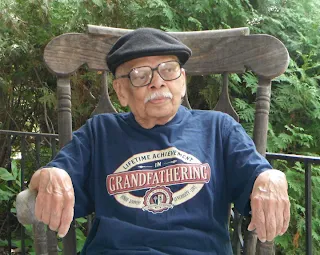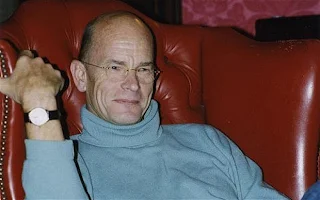Edmundo William Ros OBE [1] was a
Trinidadian musician, vocalist,
arranger
and bandleader who made his career in Britain. He directed a highly
popular Latin American orchestra, had an extensive recording career and
owned one of London's leading nightclubs.
(7 December 1910 – 21 October 2011)
Life
Ros was born in
Port of Spain,
Trinidad. His mother was an Afro-
Venezuelan and his father was of
Scottish
descent. He was the eldest of four children, having two sisters, Ruby
and Eleanor, followed by a half-brother, Hugo. His parents separated
after Hugo was born, and after various false steps Edmundo was enrolled
in a military academy. There he became interested in music and learned
to play the
euphonium. From 1927-37 his family lived in
Caracas,
Venezuela. He played in the Venezuelan Military Academy Band as well as being a tympanist in the
Venezuela Symphony Orchestra.
Later he received a music scholarship from the government, and, from
1937–42, studied harmony, composition and orchestration at the
Royal Academy of Music.
[2]
At the same time he was the vocalist and percussionist in Don Marino
Baretto's band at the Embassy Club, and also recorded several sides as a
sideman to
Fats Waller, who was visiting London in 1938.
In the 2000 New Year's Honours List, Ros (then aged 90), was appointed an
Officer of the Order of the British Empire (OBE). He
turned 100 on 7 December 2010.
[3]
Affiliations
Ros was a
Freeman of the
City of London, having been admitted to the Freedom of the
Worshipful Company of Poulters on 5 January 1965 and subsequently clothed with the Livery of the Poulters' Company on 22 June 1965. He was a
Mason, a member of Sprig of Acacia Lodge No 41,
Javea,
Spain.
Personal life
Ros married twice: first to Britt Johansen in 1950. The first
marriage produced two children, Douglas and Louisa. He designed and
built a large house in Page Street,
Mill Hill,
London NW7, which he named Edritt House, after himself and his first
wife. The house still stands, next to Copthall Girls' School. He
remarried in 1971.
Orchestra
In August 1940, Ros formed his own
rumba band, performing as
Edmundo Ros and His Rumba Band. In 1941 he cut his first tracks with
Parlophone, the first number being "Los Hijos de Buda". The band played regularly at the Coconut Grove club in
Regent Street, attracting members of
high society.
[4] Ros's bands were always based in London nightclubs or restaurants. The first was the Cosmo Club in
Wardour Street;
then followed the St Regis Hotel, Cork Street, the Coconut Grove and
the Bagatelle Restaurant. At the Bagatelle a visit from Princess
Elizabeth
and party made his name. The future queen danced in public for the
first time to Edmundo's music. In later years his orchestra was often
invited to play at
Buckingham Palace.
[5]
By 1946 Ros owned a club, a dance school, a record company and an
artistes' agency. His band grew to 16 musicians and was renamed Edmundo
Ros and His Orchestra. His number "The Wedding Samba", 1949, sold three
million 78s. His album
Rhythms of The South (1958) was one of the first high-quality
LP stereo records: it sold a million copies. He was with
Decca Records from 1944 to 1974, and altogether he made more than 800 recordings.
[4]
In 1951 Ros bought the Coconut Grove on
Regent Street
and in 1964 renamed it Edmundo Ros's Dinner and Supper Club. The club
became popular for its atmosphere and music, but it closed in 1965, when
legalised casino gambling had drawn away many of its best customers.
During the 1950s and 1960s the Ros orchestra appeared frequently on
BBC Radio, continuing into the early 1970s on
Radio Two Ballroom.
[5]
In 1975, during Ros's seventh tour of
Japan, his band's
Musicians' Union shop steward
tried to usurp Ros's authority by making arrangements with venues
behind his back. Upon their return to the UK Ros organised a celebratory
dinner after a BBC recording session and announced the disbanding of
the orchestra. He destroyed almost all the charts (arrangement sheets),
which conclusively ended the orchestra's existence.
[4]
Death
Ros retired and moved to
Jávea,
Alicante, Spain. He gave his last public performance on 8 January 1994.
Discography
78s (reissued on Harlequin CDs)
This set of ten CDs includes all the known 78s recorded up to and
including 1951; the source material was the 78rpm collection of
Christian af Rosenborg; the notes were by Pepe Luhtala; the remastering
by Charlie Crump. The series was never completed, but most of the later
Ros material is available on LP or CD. Some of the Harlequin series is
available on Naxos. Although the title of these CDs describes his group
as "Rumba Band", in the post-war period it expanded to 16 members, and
was known as "Edmundo Ros and his Orchestra".
- Edmundo Ros and his Rumba Band 1939-41, Harlequin CD 15. Includes about 8 minutes of Edmundo Ros discussing the early days of his career.
- Tropical Magic: Edmundo Ros and his Rumba Band, vol 2 1942–1944. Harlequin CD 50. Includes four sets of Edmundo Ros continuing his autobiographic reminiscences.
- Cuban Love Song: Edmundo Ros and his Rumba Band, vol 3 1945. Harlequin CD 73.
- Chiquita Banana: Edmundo Ros and his Rumba Band, vol 4 1946–1947. Harlequin CD 105.
- La Comparsa: Edmundo Ros and his Rumba Band, vol 5 1948. Harlequin CD 129.
- Chocolate Whisky and Vanilla Gin: Edmundo Ros and his Rumba Band, vol 6 1948–1949. Harlequin CD 147.
- Mambo Jambo: Edmundo Ros and his Rumba Band, vols 7 & 8 1949–1950. Harlequin CD 164/165.
- Playtime in Brazil: Edmundo Ros and his Orchestra, vols 9 & 10 1951. Harlequin CD 180/181.
10" LPs
Decca issued an initial series of 33rpm 10-inch LPs in the early 1950s, consisting of previously issued 78rpm sides. Labels were
Decca (UK and Commonwealth), and
London (a subsidiary) in the USA.
- Latin-American Rhythms, Edmundo Ros and his Rumba Band, Decca LF 1002. Latin Rhythms, Edmundo Ros and his Orchestra, London 155, is identical in content.
- Mambo with Ros. Decca LF 1038, and London LPB 341.
- Samba with Ros. Decca LF, and London LB 367.
- Latin-American Rhythms with Ros. Decca LP 1051, and London LPB 368.
- Ros presents Calypsos. Decca LF 1067, and London LB 367.
- Dance the Samba. Decca LF, and London LB 742.
12" LPs
Three labels, all owned by Decca: Decca in UK & Commonwealth;
London in USA, and Richmond, a cut-price reissue label in USA.
- Latin-American Novelties (London LL 1090)
- Ros Mambos (London LL 1092, Decca 1956)
- Latin Melodies (London LL 1093)
- Ros Album of Sambas (London LL 1117), Richmond B 20032 has same content, but only 10 numbers where Decca/London has 14.
- Ros Album of Calypsos (Decca LK 4102, 1956)
- Ros Album of Baions (Decca LK 4111), one side baiãos; the other boleros.
- Latin Carnival (Richmond B 20023)
- Rhythms Of the South (Decca 1958)
- Calypso Man (Decca 1958)
- Perfect for Dancing (Decca 1958)
- Ros on Broadway (Decca 1959)
- Hollywood Cha Cha Cha (Decca 1959)
- Fire & Frenzy (London sw 99019, 1960), with singing by Caterina Valente.
- Bongos From the South (Decca 1961)
- Dance Again (Decca 1962)
- Sing and Dance with Edmundo Ros (Decca 1963)
- Heath versus Ros (Decca Phase 4 1964)
- Caterina Valente com Edmundo Ros (London LLN-7058, 1964)
- Latein Amerikanische Rhythmen (Decca 1964), with singing by Caterina Valente.
- Heath versus Ros, Round Two (Decca Phase 4 1967)
- This is My World (Decca 1972)
- Ros Remembers (Decca 1974)
- Edmundo Ros Today (Decca 1978)
- Show Boat/Porgy & Bess (LP)
- Ros at the Opera
- Broadway goes Latin
- New Rhythms of the South
- Latin Boss...Señor Ros
- Arriba
- Latin Hits I Missed
- Hair Goes Latin
- Heading South of the Border
- The Latin King
- This is My World
- Caribbean Ros
- Sunshine and Olé!
- Give My Regards to Broadway
- That Latin Sound
- Latin Favourites (Gold Crown 1979),
- Latin Song and Dance Men (Pye 1980),
- Music For the Millions (Decca 1983),
- Strings Latino (London 1985),
- Latin Magic (London 1987),
- That Latin Sound (Pulse 1997)
- Doin' the Samba, CD
- Rhythms of the South/New Rhythms of the South, CD
- Good! Good! Good! CD
- Strings Latino/Latin Hits I Missed CD
To see more of who died in 2011
click here










